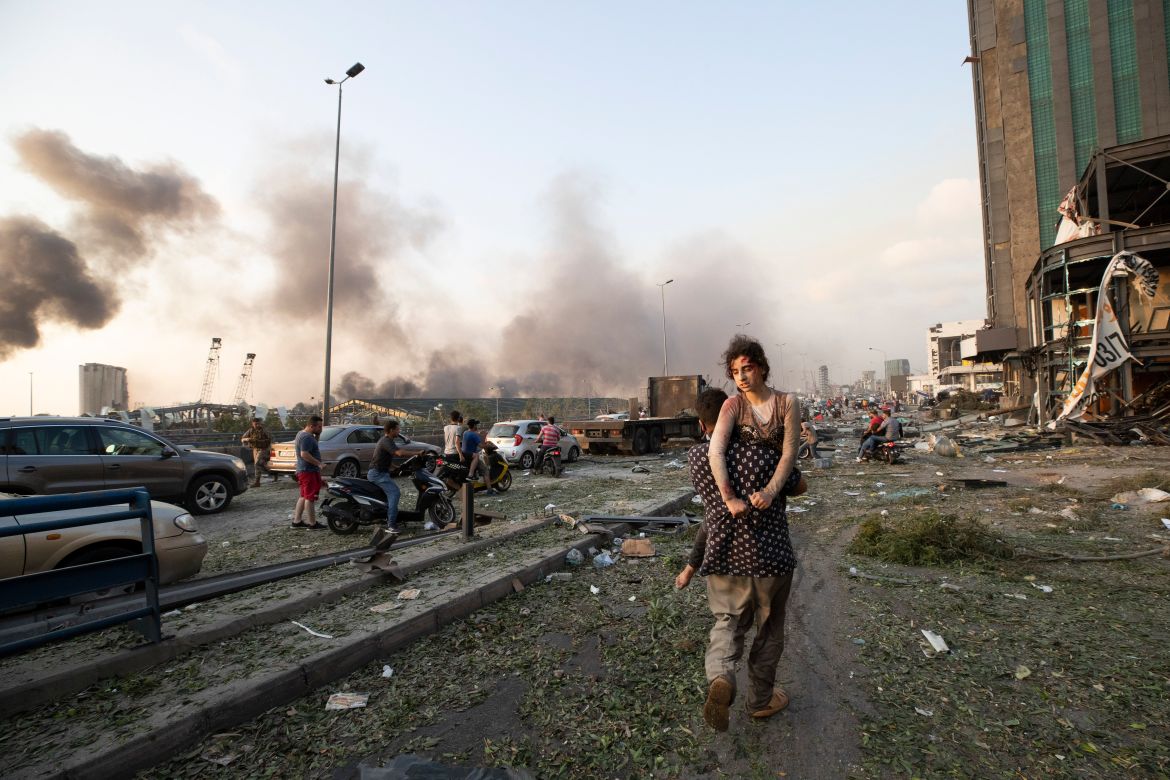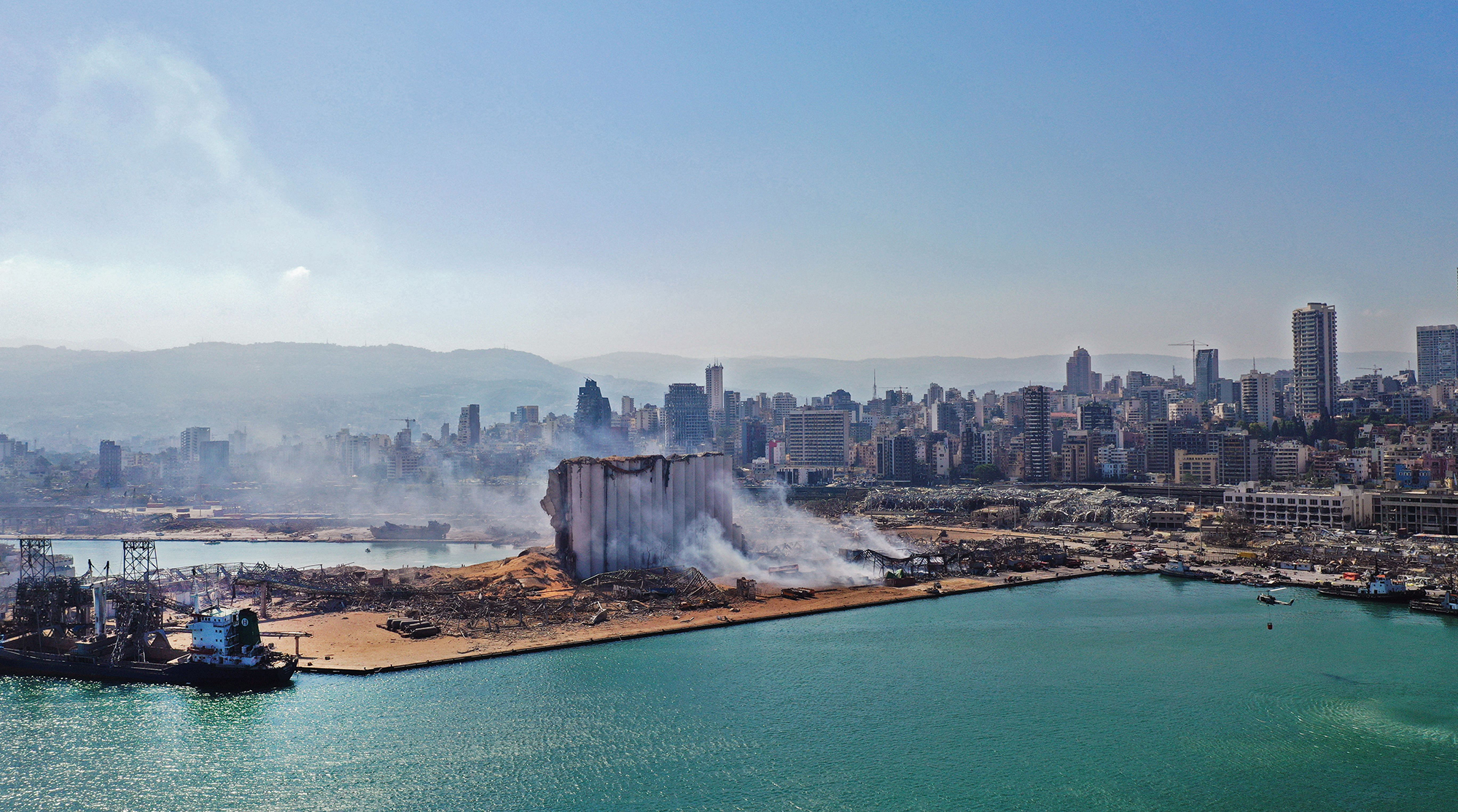It started with a desire to chronicle one of Lebanon’s worst tragedies, the explosion at Beirut’s Port on Aug 4th, 2020, through the eyes of those who witnessed it and paid the price of corruption and injustice. But when Dalal Mawad started collecting testimonies, she realised her book project was about much more than that. In “All She Lost,” the Lebanese journalist and MCJN mentor tells the broader story of Lebanon’s collapse through the stories of women whom she says pay the ultimate price. From the civil war to the collapse of the economic system and the structural legal discrimination, Dalal found that her country’s history was hardly ever told from the women’s perspective. In her book, she aims to redress this, weaving their stories with her family’s own history.
MCJN: Where did the idea for this book come from?
These women would talk for hours, without interruption, about the civil war or their struggle with abusive husbands. So I discovered that this book is beyond the Port explosion.
Dalal Mawad (DM): I never intended to write a book. Like most Lebanese, I went through a lot in 2020 and 2021, especially after the Beirut Port explosion. I moved to Paris during the first Corona lockdown and spent time reading and discovering the works of Belarusian journalist and Nobel Laureate, Svetlana Alexievich. I was deeply moved by her book, “Chernobyl Prayer/Voices from Chernobyl,” which chronicles the 1986 explosion at the nuclear reactor in Chernobyl through the testimonies of people who experienced it. This book was so powerful that it kept me awake at night. Reading it, I realised that I could use a similar approach to write a book about the Beirut explosion. I didn't know if there will be an interest in an oral history book on Beirut, but then I pitched the idea to some agents, and two were interested. I think it had to do with the timing of the idea. The explosion was still a recent event, and there wasn’t enough content about it in English. But when I began to collect testimonies, I realised that the majority of those who talked to me were women, so I changed my approach and decided to focus on women's stories and explore the broader situation that led to Lebanon's collapse.
MCJN: Given the extensive coverage of Lebanon’s multiple crises, some might argue that your book is an extended version of what's already been reported. How do you defend its uniqueness?
DM: The uniqueness lies in the women's narrative. They tell their stories in depth, with details that go beyond traditional journalism. This approach provides a more intimate and profound understanding of their experiences. The style is also distinctive. Rather than reporting what they told me, my approach drew from the oral history method. Their voices were mostly unfiltered, which made their stories relatable and compelling. If you look at the way history has been written in our region, you will not find many woman-led narratives. Women haven’t yet had the chance to narrate history from their perspective.
MCJN: You’ve conducted countless interviews throughout your career with victims of violence in all its forms. How was this experience different for you?
DM: I interviewed 30 women in total, but I couldn’t include all their stories in the book. It was challenging because most of these women hadn't spoken in detail about the explosion before. I would sit with each woman for 3-4 hours, and in some cases, I would come back if I felt the conversation wasn’t over. I would start with a broad question like: “Tell me what happened on August 4th,” and they would talk for hours without interruption, moving on to talk about other issues, like the civil war (1975-1991) or their struggle with abusive husbands or divorce, etc. This was how I discovered that this book had to go beyond the Port explosion. But there were times when the interview would end abruptly. There’s a firefighter who lost her colleague in the explosion. She became very uncomfortable during the interview, and it was over in 40 minutes. I had more questions for her, but she was so deeply traumatised, and it was very clear to me that I should stop. I felt a great emotional burden, especially when they would cry for hours. It made me question my role as a journalist and the ethical boundaries. But I chose to be human in those moments, offering support beyond just listening and writing. I cried with them, and I hugged some of them, [and] I advised some to seek legal support.
This experience made me question my role as a journalist and the ethical boundaries. I cried and hugged some of them, and I advised some to seek legal support.

MCJN: If you could do it all over again, what would you change in your approach during the interviews?
DM: Many of these women were speaking for the first time, and most of them had not had counselling, so I found myself in situations where I had to listen like a therapist, knowing very well that I do not have the knowledge or training of a therapist, and so I had to tread carefully. Looking back, I might have started by asking broader questions, not diving immediately into the painful memories of the explosion. I also could have gone deeper into discussing their experiences during Lebanon's civil war, as many women brought it up naturally during our conversations.
MCJN: You also talk in the book about the impact of Lebanon’s troubles on you personally, including your experience with Post Traumatic Stress Disorder (PTSD). How has the experience of writing this book affected you?
My grandmother never got justice for the killing of her husband. Interviewing these women, I could see history repeating itself.
DM: Writing about Lebanon's collapse and the Beirut explosion, something I experienced first-hand, was deeply personal and challenging. It made me confront feelings of guilt for leaving Lebanon and not doing enough. But it allowed me to process my emotions and become a part of the collective story. I talk in the book about my grandmother who lost her husband in 1957. He was never involved in politics, yet he was killed in feudal fighting. Every time my grandmother tells the story, she would cry, and all I can do is hug her while feeling helpless. She never got justice for his killing, and interviewing these women, I could see history repeating itself.
MCJN: What audience did you have in mind when writing the book?
DM: While Lebanese and Arabs abroad might find it relatable, my primary audience was people interested in the Middle East and Lebanon who might not be aware of the details of the situation. I wanted to keep the story alive for those who care about women's experiences and human stories but weren't directly impacted by the event. Writing in English was a conscious choice to make this documentation accessible to a wider audience.
MCJN: Do you believe this book might contribute to achieving accountability in Lebanon?
DM: While I can't predict the future, the book serves as evidence and documentation. I use it to continue raising awareness and advocating for justice, reminding the world that the story is far from over, and accountability is essential for Lebanon's future.
